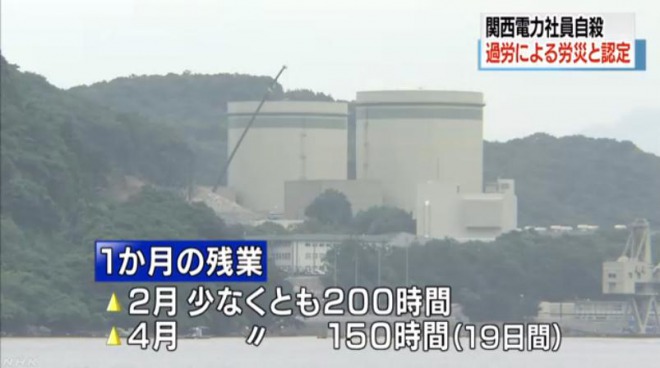A labor standards office has found that a Kansai Electric Power Co employee who logged hundreds of extra work hours pursuing approval to restart and extend the operating life of two aging nuclear reactors killed himself in April due to overwork, according to sources close to the matter.
The employee in his 40s with section chief status was trying to obtain approval from the Nuclear Regulation Authority to operate the Nos. 1 and 2 reactors at the Takahama power plant in Fukui Prefecture beyond 40 years, the sources said Wednesday.
The man is estimated to have worked over 200 hours in overtime in February and around 100 hours in both March and April. He committed suicide at a hotel in Tokyo in mid-April during a business trip.
The Tsuruga Labor Standards Inspection Office in Fukui concluded that overwork led him to kill himself, thus deeming him eligible for benefits under its workers’ accident compensation insurance program.
The No. 1 reactor at the Takahama plant began operating in November 1974, and the No. 2 reactor in November the following year. Both reactors have been suspended since 2011, following the Fukushima nuclear disaster in March that year.
The aging reactors were approaching the government-mandated 40-year service period, and to continue operating beyond that limit Kansai Electric needed to obtain the approval of the regulator. Failure to complete the required procedures risked having the reactors destined for decommissioning, with a direct impact on the profitability of Kansai Electric which depends heavily on nuclear power.
The employee was considered to be in a managerial position and was not restricted by working hour limits under the Labor Standards Law. But the company had an obligation to pay attention to his overtime hours and health condition.
The employee’s working hours surged in January, and since March he often visited Tokyo to develop documents and have talks with the Nuclear Regulation Authority. He looked tired and his colleagues were concerned about his health, the sources said.
The utility declined to comment on the employee’s suicide.
In June, the regulator approved an additional 20 years of operation beyond the government-mandated 40-year service period for the two aging reactors.
Source: Japan Today





















